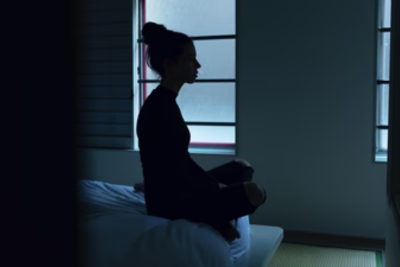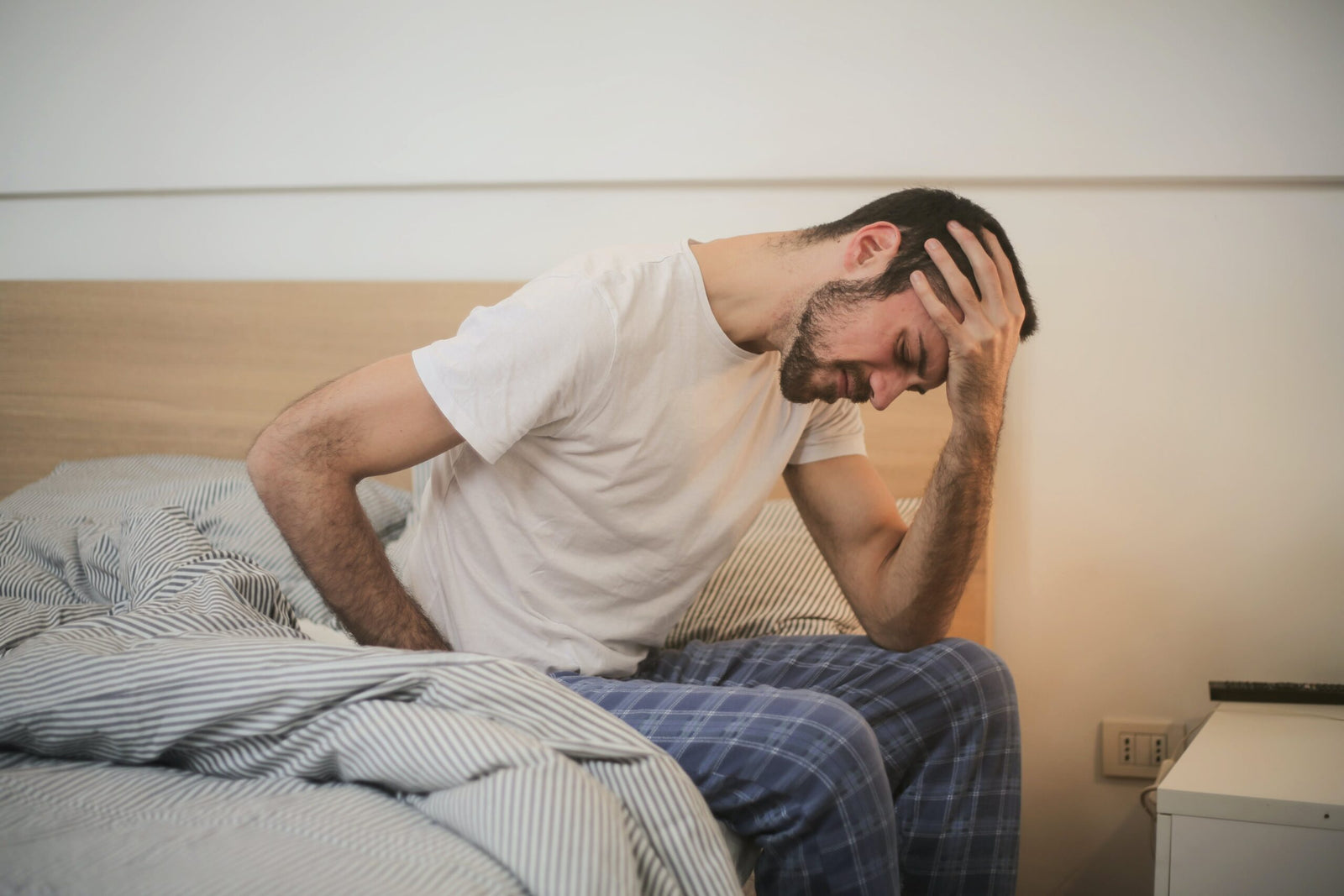
Intro:
It’s the middle of the night and, once again… you’re wide awake. Staring into the distance and fretting about how you’re going to function tomorrow on little-to-no sleep. Hmmm, is fretting keeping you awake? Or is it something else? Let’s look at ten reasons you’re awake—and how to fix that.
There are many reasons we lose sleep, and we won’t cover them all here. What we will do is look at some common reasons you’re awake when you should be sleeping. We’ll also offer up some tips for dealing with these sleep issues so you can start getting the sleep you need.
1. Acid Reflux—an unpleasant wake-up call:
Though probably not top of mind, this could be a reason you're awake: People with the condition known as acid reflux are twice as likely to suffer sleep problems. Acid reflux causes the acid in the stomach to come back up the esophagus which leads to heartburn—a burning sensation.
Whether or not this unpleasant process awakens you, the acid, which is now in your esophagus, will trigger a reflex in the muscle to clear the acid. This will almost certainly disrupt your slumber.
Is it serious?
Acid Reflux is a common medical condition and can range in severity from mild to serious. GERD (Gastroesophageal reflux disease) is the chronic, more severe form of acid reflux.
How to fix that
You can help prevent GERD and control Acid Reflux by knowing which foods and beverages trigger your symptoms—and then avoiding them. These triggers differ from person to person but here are some familiar ones:
Acid & GERD Triggers
- Alcohol
- Caffeinated beverages
- Chocolate
- Citrus fruits
- Fatty and fried foods
- Garlic
- Onions
- Peppermint
- Spicy foods
- Tomatoes
Left untreated, GERD can progress into other related diseases that are significantly more bothersome—and dangerous—like esophageal cancer. Start making adjustments to your lifestyle now to get this condition under control.
Lifestyle Changes
- Cut back on acidic and fatty foods.
- Avoid alcohol, chocolate, peppermint and coffee.
- Eat smaller meals and avoid pre-bed snacks.
- Are you a smoker? Quit.
- If you’re overweight, try to take off some pounds.
- Avoid tight-fitting clothes.
- Raise the head of your bed 6-inches.
An antacid, H2 blocker, or proton pump inhibitor may also help. These are available over the counter, or by prescription. Check with your doctor.

Prevent GERD, and control Acid Reflux by knowing which foods and beverages trigger your symptoms.
2. Allergies—will wake you more in the Fall:
One reason you’re awake in the Fall: Allergies which are known to impair every aspect of our sleep affect 40% of us this time of year. Leaves, weeds and mold spores are on the attack, causing symptoms that makes us uncomfortable and grumpy.
Once these allergens enter nasal passages, breathing properly becomes difficult, and it only gets worse in the evening. This can really wreck our sleep—for nights on end.
If you’re looking for a fix, these tips will help:
- Close windows to block out pollen, dust, and mold.
- Change the filters in your air system to avoid dust mites.
- Change linens often—or try hypoallergenic bedding.
- Remove wet floor coverings that could attract mold.
- Stick with indoor activities on very windy days.
Like allergies, colds and flu also keep us awake
Allergies, colds, sinus infections, flus, and other miscellaneous bugs make it tricky to fall asleep and stay asleep. When it’s hard to breath, your muscles are aching… and you can’t stop coughing, it’s a safe bet you won’t get much sleep unless you stay on top of your symptoms.
Supplementing any medications with home remedies and practical measures will help ease your discomfort to speed your recovery.
These tips will fix you up:
- Loosen congestion by drinking something warm 60-90 minutes before bed.
- Nasal decongestants help reduce swollen nose tissue and decrease mucus
- For a sore throat, try gargling with warm salt water—it will also help stave off infection.
- Setting your thermostat between 60-67 degrees will improve your sleep comfort.
- Elevate your head to prevent mucus build-up and avoid coughing
There are other things about Fall that keep us awake—like changing the clocks and sleep cycle disruptions. In fact, Fall can really do a number on you if you’re not doing everything you can to keep your immunity boosted.
Start now by prioritizing your sleep. Getting less than 6-hours per night leaves your immune system at the mercy of the seasons.
3. Anxiety—worrying blocks REM sleep:
Another reason you’re awake? You worry too much: Sleep is a basic building block for mental health, but anxiety and depression can severely impede this vital resource by causing sleep pattern interruptions. This makes it harder to reach REM sleep.
Should I be worried about my worry?
Anxiety disorder, the most common mental illness in the U.S., affects 40 million adults each year—that’s over 19% of the population. These conditions develop from risk factors including genetics, brain chemistry, life events and personality.
We all have periodic anxiety, but it’s considered a disorder when excessive worry and fear continue beyond one stressful event. If this state of mind persists, we see it interfering with daily life. It affects our ability to function normally in managing our tasks, relationships—and ultimately, our sleep.
This can become a serious problem. That said, worrying more will definitely not help. Instead, take positive action to fix it.
What to do when being anxious becomes a “disorder.”
The Anxiety and Depression Association of America tells us, anxiety disorders are highly treatable but less than 40% of those suffering from them receive treatment—which puts the remaining 60%+ at risk. They are 6x more likely to be hospitalized for psychiatric disorders.
Familiar Anxiety Disorders
- GAD—General Anxiety Disorder is characterized by excessive anxiety and worry that occurs most days for at least 6 months.
- PD—Panic Disorder presents as unexpected, repeated episodes of intense fear, accompanied by physical symptoms. These events occur without a known fear or stressor and may manifest in chest pain, shortness of breath, dizziness or abdominal distress.
- SAD—Social Anxiety Disorder is the persistent fear of one or more social performance situations in which one is exposed to unfamiliar people or possible scrutiny by others. The fear is that they will embarrass themselves and feel humiliated.
- Stress— The American Psychological Association considers stress in America a national mental health crisis. How is stress different from Anxiety? The difference between the two, is that stress is a response to a threat in a situation. Anxiety is the reaction to the stress trigger.
Specific Phobias— obsessive-compulsive disorder (OCD) and posttraumatic stress disorder (PTSD)are closely related to anxiety disorders. They are sometimes experienced along with general anxiety and may result in depression—a known sleep disruptor
Why do I have an anxiety disorder?
With anxiety disorders, the amygdala in the brain becomes overactive. De-stressing exercises are one of the most effective ways of dealing with it. You can also try some other simple tips on your own:
Tips to fix anxiety so you can sleep
Re-focus your brain
Get out of bed and go to another part of the house—don’t turn on lights. Do something mindless—no brain stimulation—don’t think about not being able to sleep. When your mind has settled down, return to bed.
- This is a strategy called stimulus control—basically, you're awake because you associate your bed with anxiety, and this helps stop the negative association.
Relax your brain
You're awake because your mind is busy: Most of us have experienced “noisy brain,” – you can’t stop thinking about an issue with work, the bills piling up, what to do about an aging parent. Or, if you’re like me… you have a sudden random idea that suddenly takes over your brain and runs amok.
- Pink noise is known to calm the brain—putting one into a relaxed state which allows you to fall asleep easier, sleep deeper and longer, and wake up refreshed. Our noise masking earbuds play a soothing pink noise and are just the thing to calm the noise in your brain.
Let a doctor fix that
Anxiety is common in older adults and anxiety disorders in the older population most frequently occur following traumatic events such as a fall or acute illness.
- For the majority of folks, these conditions are treatable through a range of options. These include therapy, medication, complementary and alternative treatments, and TMS (transcranial magnetic stimulation.)
Ask your doctor to help you with a game plan.
Try to spend at least 15 minutes a day outdoors to make sure your skin is making enough contact with the sun to prevent vitamin D deficiency.

4. D-Deficiency—Disrupts your sleep cycle
If you’re awake for this reason, your sleep cycle is off kilter. Not getting enough of the sunshine vitamin makes it impossible to sleep well. In his article, The Best Vitamins for Sleep, Dr. Michael Breus (the Sleep Doctor,) emphasizes the relationship between vitamin D and sleep as well as the consequences of vitamin D deficiency.
Studies show this hormone affects the amount of sleep we get as well as the quality of that sleep. While it is common for us to have sleep pattern changes, those sleep cycle interruptions result in physiological impairments that lead to increased risk for conditions including:
- Weakened immune systems
- Cardiovascular disease
- Reduced cognitive function
What causes vitamin D deficiency
Vitamin D is naturally produced in our bodies when the sun’s UVB rays come into contact with our skin. Lack of exposure to sunlight is the #1 cause of vitamin D deficiency. Heading into the winter months, make a point of getting natural sunlight when you can—just 15 minutes will provide an adequate supply for the day.
How vitamin D regulates sleep
Vitamin D assists the body in the production of Melatonin, the hormone that helps regulate human circadian rhythms. Your natural sleep-wake cycle repeats every 24 hours and signals your body to feel sleepier at nighttime, and more alert during the day.
When this cycle is disrupted, it disorders your sleep, causing you to feel excessively sleepy in the daytime. You may also lack focus, find yourself irritable—and may ultimately become depressed. Lack of vitamin D can also lead to sleep disruptive conditions that further interfere with your sleep cycle—such as:
- OSA (Obstructive Sleep Apnea)
- Restless Leg Syndrome.
Symptoms of vitamin D deficiency
Do you feel extremely fatigued, even dizzy? Are you more prone to getting colds and flu? Does it take longer to recover from illness or injuries? These are all indicators you may be vitamin D deficient. These symptoms may also be present:
- Muscle weakness
- Muscle pain in the legs, spine, and pelvis
- Loss of appetite
- Not sleeping well
- Depression or feelings of sadness
- Skin issues
- Hair loss.
Vitamin D deficiency is no joke and can quickly lead to serious conditions like sleep apnea, osteoporosis and bone disease.
Fixing a vitamin D deficiency
Why wait? Start getting more vitamin D naturally through sunlight and nutrients now—before you begin seeing symptoms. You can find vitamin D in these foods:
- Egg yolks
- Fatty fish
- Fortified Dairy
- Liver & Red meat
- Mushrooms
- Orange Juice
If you’re already having symptoms, check with your doctor to see if you may need to begin a supplement regimen.
Never leave this condition untreated. Vitamin D deficiency will negatively affect your sleep, disrupt your general health, and may create a need for surgery.
5. Hyperthyroidism—causes fitful sleep
A less known reason you’re awake: Also known as overactive thyroid, Hyperthyroidism occurs when the thyroid gland creates too much of the thyroxine hormone. Since the thyroid’s key function is controlling metabolism, it’s kind of thrown into a tizzy. All the hormone levels are out of balance and this malfunction creates chaos.
If you’re experiencing anxiety, rapid heartbeat, unexplained weight loss, tremors, unusual sweating—including at night, swelling at the base of your neck… your sleep problem may be a thyroid problem.
These symptoms, are in addition to the fitful sleep that’s causing your daytime sleepiness and general fatigue... but wait, there’s more…
Additional symptoms include:
- Brittle hair
- Constipation
- Dry Skin
- Frequent urination
- Hoarseness
- Menstrual changes
- Muscle weakness
- Thinning hair
Hypersomnia
Hypersomnia, a sleep disorder characterized by excessive daytime sleepiness, may also manifest. While Hypersomnia can be caused by an underlying medical condition, Hyperthyroidism is most often considered the cause because it disrupts the endocrine system.
These are the are the glands and organs that help coordinate body functions from metabolism—to growth—to blood pressure, emotions, and sleep. This system disruption leaves one feeling anxious and cranky with extremely low energy.
Can this be fixed?
It will require medical attention beginning with a simple blood test to see if you do indeed have a thyroid issue. Medication can keep your thyroid hormones at a normal level. Regular monitoring is essential.
What you can do on your own to support better sleep
Create a regular bedtime wind-down routine and stick to it.
- Avoid heavy meals before bed.
- Cut off alcohol and caffeine a few hours before bed.
- Set your thermostat at a comfortable temperature (around 65 degrees)
- Turn off electronics an hour before bed
- Create a relaxing mood with music
- Try reading or taking a long bath
Working with your doctor, you’ll be able to keep your thyroid in check so you can get the sleep you need.
Vices—will keep you awake:
Here are 4 reasons you’re awake wrapped up together: Lifestyles play a big role in the quality of our sleep and when it comes to our vices, our attachment to them creates sleep roadblocks. Do one or more of these apply to you?
 Cutting off alcohol at least 4 hours before bed will help lessen its sleep disrupting effects.
Cutting off alcohol at least 4 hours before bed will help lessen its sleep disrupting effects.6.—You’re awake because you drink alcohol too late.
While millions of people use alcohol to induce sleep, about 20% of us actually rely on that—and it can be a big sleep problem. Sure, it helps you unwind and can make you feel sleepy, but in the end, it’s going to disrupt your sleep. How?
- It keeps you in the lighter stages of sleep
- It dehydrates you
- It wakes you up to go to the loo
Worse, when you wake up, you’re going to feel lousy—and like you haven’t actually slept—you may even be wondering… Is this hangover gonna last forever?
In this WebMD video, Dr. Michael Breus says, “Half the reason that people have a hangover is from sleep deprivation—the other half is from the dehydration.” It’s a double whammy—but it’s one you can avoid.
If you're awake for this reason, here's how to fix your sleep: Cut off alcohol at least four hours before you go to bed to lessen its' negative effects.
If you can't avoid late meals, choose a light carbohydrate option to avoid sleep disruptions.

7.—You’re awake because you eat heavy meals too close to bedtime
You already know this can cause indigestion and weight-gain. Did you know it can wake you up as well? Too much protein is an especially bad idea right before bed—it takes a lot of energy to digest, which keeps your system working while you’re trying to sleep.
How to fix this? If you can’t avoid late meals, choose a light carbohydrate option like an egg and veggie scramble, or a salad with a small amount of chicken—and no, that wouldn’t be fried chicken.

The blue light from your phone and other devices blocks melatonin production in your body, making it harder to fall asleep and stay asleep.
8.—You’re awake because you use your phone too much
When will any of us learn to cut the cord so to speak? They can tell us about the negative ramifications of blue light til they’re blue in the face (ha-ha,) but that phone is still the first thing we pick up in the morning… our pacifier during the day, and the last thing we put down in the evening. Even though we’ve been told a bazillion times it’s no good for our sleep—or our general health for that matter.
That said, I’ll go ahead and remind you anyway: The blue light from your phone and other devices blocks melatonin production in your body and makes it harder to fall asleep and stay asleep. Don’t be offended, I’m reminding myself as well. Which, sadly doesn’t mean I won’t be on YouTube or playing Domino Go before bed this evening—but I have been trying harder...
We can all fix this by avoiding use of our gadgets in the hours before bed, keeping the phones at least a foot away from our faces, and using blue-blocking glasses.

9.—You’re awake because you’re smoking before bed
Sorry, but you’ve been had. That cigarette you’re smoking to help you relax is just a neurochemical trick. Nicotine is a stimulant—and it’s likely to wake you up more than once during the night! You’d almost be better off drinking a cup of coffee and we all know what a bad idea that is.
Smoking also irritates the esophagus and the airways which causes coughing and can trigger acid reflux.
This isn’t an easy fix. Nicotine is highly addictive and hard to kick—especially for women. Try anyway. Your whole body will thank you.
Your Vices aren't just keeping you awake.
Harmful behaviors, habits, and addictions sabotage many other aspects of our lives—not just our sleep. While we often use them to cope with stresses in our lives, there are healthier options. Here are some better ways to cope with your stress:
- Deep breathing
- Regular exercise
- Nature walks
- Watching less news
- Talking with a friend
These are all good measures to take, but sometimes our vices are already beyond our control.
How to know if your vice has turned into an addiction
- Your work or family obligations are suffering
- You’ve tried to stop and can’t
- You tell little white lies to others
- You’re overspending on your habit
- You isolate from others due to your vice
Understanding how addiction works is important when dealing with your vice so that you don’t simply replace it with another coping mechanism. This may be more than you can deal with on your own so talking with someone who’s familiar with addiction is your best bet.

Another reason you’re awake? Too much worry and too much stress.
10.—You’re a Caregiver—and it’s wearing you out
Of all the reasons you're awake, this may be the most complicated to deal with. Why? You’re awake because someone needs you. Sometimes we get so caught up in our responsibilities to others, we fail to take proper care of ourselves—and that leads to burnout.
If you’ve provided long term care for a friend or family member, you already know it consumes not just your time, but much of your physical, mental and emotional resources.
You need to make sleep a priority
To rejuvenate, and be the best you can be, you need a full night of uninterrupted sleep—every night. Unfortunately, that’s not what usually happens. Approximately 76% of caregivers report poor sleep quality due to all the stressors. This disrupted sleep causes you to be dysfunctional during the day—which is dangerous for you—and the people you care for.
The best way to prevent mistakes and accidents with the person who is relying on you for care, is to take proper care of yourself.
Coping strategies for Caregivers
As with all of us, basic health and fitness rules apply… getting proper nutrition and exercise, finding ways to relax, and maintaining a sense of humor are all helpful. With caregiving, however, coping is heavily weighted toward psychology. This is partly due to the fact that sick people tend to be on the cranky side and are often manipulative. If you already have your own baggage, your buttons are easily pushed.
Brainline.org offers 8 Essential Caregiver Coping Strategies. #7 seems particularly pro-active and relevant. Here it is, along with the first few bullet points:
“Make a Personal Declaration...
Think about the following self-statements and decide to make them a part of your daily life:
- Taking care of myself is necessary if I am to give care to others.
- I know my own limitations and strengths. I seek help when I need it.
- I have the right to feel what I feel and to express those feelings in a calm manner.
- I maintain the right to my own life outside of care giving… “
Troubling caregiver facts
A 2020 report reveals an increase in the number of family caregivers in the United States of 9.5 million from 2015 to 2020. Family caregivers now encompass more than one in five Americans. The study also reveals that family caregivers are in worse health compared to five years ago.
Because you care…
Caregivers care about what’s best for the person they’re caring for and that’s usually how they find themselves in this role. Aside from financial limitations, they worry about safety issues if the patient were to be left on their own. They’re also rightfully concerned about the quality of care outside sources might provide. Guilt may also come into play.
The bottom line is your role as caregiver can only be performed well if you meet your basic human needs. You may get around eating proper meals with energy bars for a while, but there is no substitute for sleep.
Fix your caregiver overwhelm by practicing proper self-care—and don’t hesitate to seek qualified help.
Know a caregiver who needs help?
If you know a caregiver who’s starting to look a little ragged, there are some simple ways to lend a hand. Take it from someone who knows, they’ll be forever grateful:
- Give them a break to take a walk
- Send a card to lift their spirits
- Bring them a latte or favorite snack
- Make them a self-care basket
- Share a favorite book
- Be a good listener
Caregiving can be difficult and is often depressing. Show support for someone who needs it—you never know when that someone might be you.
When others disrupt our sleep patterns...
Sometimes the reason you're awake has nothing to do with what You are—or are not—doing. Other people's noise is a big problem for many of us. Snoring partners, noisy roommates, barking dogs, fireworks, banging hotel doors... the noise itself is bad enough but it doesn't end there.
Other people's noise adds an extra layer of stress to the problem. Emotions. Not only are we awake but now we're resentful—the sooner this gets resolved, the better for our sleep—and our relationships. SoundOff's noise masking technology is powerful enough to completely block out any of the aforementioned sleep disruptors.
Don't spend another night awake and aggravated! Soothe your ruffled feathers and silence the annoying noise with our soothing pink noise earbuds.
Save your sleep—and your relationships—With SoundOff you won't hear the snoring anymore. Or the barking dogs... or partying neighbors...

So, what's keeping you awake?
Hopefully, we’ve answered some questions and provided solutions for you here. If you're still searching, consider checking out this comprehensive resource from the Sleep Foundation
Wishing you awesome sleep. All night, every night!

































